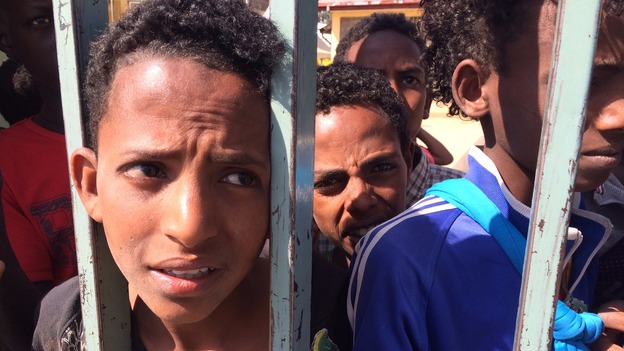Thousands battle across deserts and sea to escape 'Africa's North Korea'
2016-02-24 11:28:38 Written by John Ray Africa Correspondent Published in English Articles Read 2807 timesA large proportion of the migrants arriving in Europe from Africa have come from the small, secretive nation of Eritrea.
Thousands of Eritreans readily risk death trekking across the gruelling Sahara and take the desperate gamble of a sea crossing to flee one of the world’s harshest regimes.

A newly arrived child at a reception centre of Eritrean refugees in the north of Ethiopia Credit: ITV News
In the sleepy streets of the border town not long after dawn it is a startling sight.
Hundreds upon hundreds of men and women marching in neat ranks towards us.
They are the latest escapees from Eritrea; one of the world’s most forbidding regimes.
They’ve been picked up close to the border by Ethiopian patrols and brought to one of several reception centres.
This is the everyday routine, says a senior official from the United Nations.
 A refugee camp in northern Ethiopia that's home to many thousands of Eritrean refugees. Some stay for years, but for many it's a stop off only on their journey to Europe. Credit: ITV News
A refugee camp in northern Ethiopia that's home to many thousands of Eritrean refugees. Some stay for years, but for many it's a stop off only on their journey to Europe. Credit: ITV News
By one UN estimate, 9% of Eritrea’s population of 4.5 million has fled the country.
One in fifty has sought a new home in Europe.
Eritrea is known as African’s North Korea. A small, secretive state that has lived under emergency rule for 18 years.
No elections, no opposition parties, no free media.
The UN has accused its leaders of crimes against humanity.
Accusations of mass surveillance, arbitrary detention and torture feature strongly in the reports of human rights organisations.
Almost every male refugee we spoke to at the Mai Ani camp tells the same story; how they wanted to avoid compulsory military service, a form of forced labour that can last indefinitely.
Robel Habtie is a slender, gentle young man. He told me how he and his friends slept for three nights in the mountains to avoid the call up.
 Robel Habtie has fled Eritrea, which has earned a reputation as Africa’s North Korea Credit: ITV News
Robel Habtie has fled Eritrea, which has earned a reputation as Africa’s North Korea Credit: ITV News
In the end, he decided to run for the border.
"How can I live there?’" he asks. "There is no work, no money, no chance."
The journey to Europe, across the desert and the Mediterranean is notoriously dangerous.
But until 2014, most Eritreans could at least expect to be welcomed as genuine refugees.
But that’s changing; as the well of sympathy dries up in the face of the larger Syrian crisis.
According to Amnesty International, the refusal rate for Eritrean applicants for asylum has jumped from 14% to 66%.
But that doesn’t deter Robel, and many like him.
He has a just few dollars in his pocket, only the clothes he stands up in, but he has his heart set on Britain.
"If I have a chance to get to Europe, then I will try," he tells me.
"I can think of how my family live in Eritrea. I want better."






















